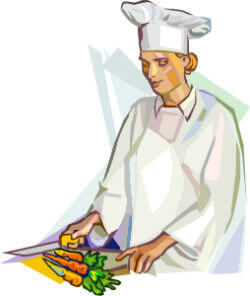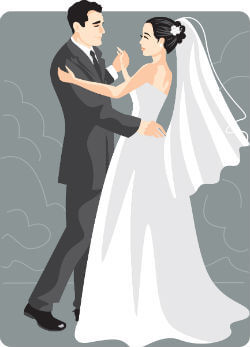Participios en inglés
Los participios en inglés tienen varias funciones diferentes en el idioma inglés. Entonces hagámoslas claras y fáciles de entender.
Click Here for Step-by-Step Rules, Stories and Exercises to Practice All English Tenses
¿Qué significa "participio"?
¿Qué es un participio?
La palabra participio tiene su raíz en una palabra latina que
significa "compartir, participar" (o en otras palabras, participación).Definición del participio
Un participio es una forma del verbo que se usa con otro verbo para formar ciertos tiempos verbales.Por ejemplo:
 I am eating an apple.
I am eating an apple.
(Estoy comiendo una manzana.)
EATING es una forma del verbo EAT.
Se usa con otro verbo (AM) para formar el tiempo verbal presente progressive (presente progresivo).
Entonces EATING es un participio.
 I have
washed the dishes.
I have
washed the dishes.
(He lavado los platos.)
WASHED es una forma del verbo WASH.
Se usa con otro verbo (HAVE) para formar el tiempo verbal present perfect (presente perfecto).
Entonces WASHED es un participio.
En inglés hay principalmente dos tipos de participios: el participio presente y el participio pasado.
Participio presente
El participio presente termina en "-ing".Ejemplos de participios presentes:
- Walking
(Caminando)
- Helping
(Ayudando)
- Drinking
(Bebiendo)
- Taking
(Tomando)
- Past progressive (pasado
progresivo)
- Present progressive (presente
progresivo)
- Future progressive (futuro
progresivo)
- Past perfect progressive
(pasado perfecto progresivo)
- Present perfect
progressive (presente perfecto progresivo)
- Future perfect progressive (futuro perfecto progresivo)
Oraciones con ejemplos:
- They are dancing together right now.
(Están bailando juntos ahora.)
- John was painting the wall all morning.
(John estaba pintando la pared toda la mañana.)
- I will be sleeping by the time you come back.
(Estaré durmiendo para cuando vuelvas.)
Haz clic aquí para leer el artículo completo sobre el participio presente.
Participio pasado
El participio pasado termina en "-d" o "-ed" en el caso de un verbo regular o de manera diferente
en el caso de un verbo
irregular.Ejemplos de participios pasados:
- Walked
(Caminado)
- Helped
(Ayudado)
- Drunk
(Bebido)
- Taken
(Tomado)
Oraciones con ejemplos:
- They have danced together in the past.
(Han bailado juntos en el pasado.)
- John had painted the wall before he sold the house.
(John había pintado la pared antes de vender la casa.)
- I will have fallen asleep by 8 o'clock tomorrow.
(Me habré quedado dormido para las 8 horas mañana.)
Oraciones con ejemplos:
- The wall was painted by John.
(La pared fue pintada por John.)
- The apple was eaten by me.
(La manzana fue comida por mí.)
- We were given some good advice.
(Se les dieron buenos consejos.)
Participios como adjetivos
Tanto el participio presente como el participio pasado pueden ser usados como adjetivos.Por ejemplo:
| Participio presente | Participio pasado |
| Boring (Aburrido) Interesting (Interesante) Confusing (Confuso) Amazing (Asombroso) Annoying (Molesto) Exciting (Emocionante) |
Bored (Aburrido) Interested (Interesado) Confused (Confundido) Amazed (Asombrado) Annoyed (Molesto) Excited (Emocionado) |
Oraciones con ejemplos:
| Participio presente | Participio pasado |
| The movie was very boring. (La película fue muy aburrida.) That book was so interesting. (Ese libro fue tan interesante.) His message was a bit confusing. (Su mensaje era un poco confuso.) What an amazing speech! (¡Qué discurso asombroso!) You really are annoying . . . (Eres muy molesto...) James has an exciting job. (James tiene un trabajo emocionante.) |
Why do you look so bored? (¿Por qué te ves tan aburrido?) She is very interested in music. (Está muy interesada en la música.) I feel quite confused. (Me siento bastante confundido.) We were quite amazed to see her. (Estábamos bastante asombrados de verla.) The audience became annoyed. (La audiencia se molestó.) We are so excited! (¡Estamos tan emocionados!) |
Los participios se usan con los verbos auxiliares.
Haz clic aquí para recibir el curso por correo electrónico Verbos auxiliares en inglés.
Practicar con el participio presente
Lee el siguiente cuento. Los participios presentes están
subrayados.Después de leer puedes completar los ejercicios.
At
a Wedding
Bob and his mother are at his sister's wedding. His mother seems
worried and keeps asking him questions.Bob: Isn't this wonderful, Mom. Ann is getting married today.

Mom: Yes, yes. It is.
Bob: Aren't you excited?
Mom: Of course. I'm also feeling anxious. What if something goes wrong?
Bob: What could go wrong?
Mom: Well, where is the minister?
Bob: He's standing by the door talking to Uncle Pete.
Mom: Ok. Well, what about, Dan, the groom? Where is he hiding?
Bob: Remember, he is waiting in the room next door. He will come in when the music starts.
Mom: Fine. Maybe I'm just worrying too much. But I just want today to be perfect for your sister.
Bob: It will be. Relax. Look, everyone is here. Aunt Sara and Uncle Mike are talking to John and Pam over there. Sally and Louise are standing in the corner laughing about something. Even Grandpa Mike is enjoying himself. See? He is sitting in the front row smiling.
Mom: I suppose you're right.
Bob: I am. Just relax. And just think, after this, we will get to go to the reception and everyone will be able to have fun.
Mom: Oh! The reception. Oh dear. I should have called the caterer (person bringing food) and checked to be sure they had everything they needed.
Bob: I'm sure they are ok. They are professionals. They do this all the time.

Mom: But what if the ovens aren't working and the food gets cold?
Bob: They are bringing lots of food warmers to keep the food hot remember?
Mom: Oh, right. And what about the drinks? What if the bartender (person who makes drinks) is having trouble finding the reception?
Bob: He works at the hotel where we are having the reception. I'm sure he knows how to get there.
Mom: And the dance floor. What if it is too small?
Bob: People will manage. Not everyone dances at the same time.
Mom: What if nobody dances?
Bob: People always dance at weddings, Mom.

Mom: I guess you're right. Maybe I should just relax.
Bob: Yes. Relax and enjoy the day. Your only daughter is getting married. This is exciting.
Mom: I know. But I'm going to miss her.
Bob: She's not going anywhere. She and Dave are staying in town. They'll be living ten minutes from you.
Mom: But if she's married, I don't want to bother her. I won't call her as much as I do now.
Bob: Mom, you aren't bothering her when you call. She loves talking to you.
Mom: Are you sure?
Bob: Yes, I'm sure. She told me this morning how much she loves you and how happy she is to be living close to you.
Mom: Really?
Bob: Yes.
Mom: Well, that makes me very happy to hear.
Bob: It should. Not all daughters enjoy being with their mothers.
Mom: This is true. Oh! The music is starting. That must mean that it's time for the wedding to start.
Bob: It does. Look, here comes Ann now. She looks beautiful!
Mom: Yes, she does!
And now, practice:
At a Wedding - Exercises
Vocabulary Questions
1. What does "anxious" mean?a) nervous
b) sad
c) happy
d) angry
b) sad
c) happy
d) angry
2. What does "caterer" mean?
a) a person who makes drinks
b) a person who plays music
c) a person who brings food
d) a person who works at weddings
b) a person who plays music
c) a person who brings food
d) a person who works at weddings
3. What does "professional" mean?
a) happy
b) expert
c) understanding
d) unsure
b) expert
c) understanding
d) unsure
Grammar Questions
1. He is sitting in _________ front row smiling.a) a
b) the
c) an
d) that
b) the
c) an
d) that
2. They _________ lots of food warmers to keep the food hot remember?
a) bring
b) are bringing
c) brought
d) have brought
b) are bringing
c) brought
d) have brought
3. He works _________ the hotel where we are having the reception.
a) in
b) at
c) on
d) of
b) at
c) on
d) of
Comprehension Questions
1. Who is getting married?_______________________________________________________________
2. What worries Bob's mother about the food?
_______________________________________________________________
3. What worries Bob's mother about the dance floor?
_______________________________________________________________
Get Updates, Special Offers, and English Resources
Download your FREE GIFT (the first two chapters of
English Short Stories Book and Workbook)
as soon as you join!

By submitting your email, you consent to receiving updates and newsletters from us and to the sharing of your personal data with third parties for the purposes of sending you communications. We will not spam you. You can unsubscribe at any time. For more information, please see our privacy policy.
Volver de Participios en inglés a Gramática inglesa fácil
Volver de Participios en inglés a Aprender a escribir en inglés





